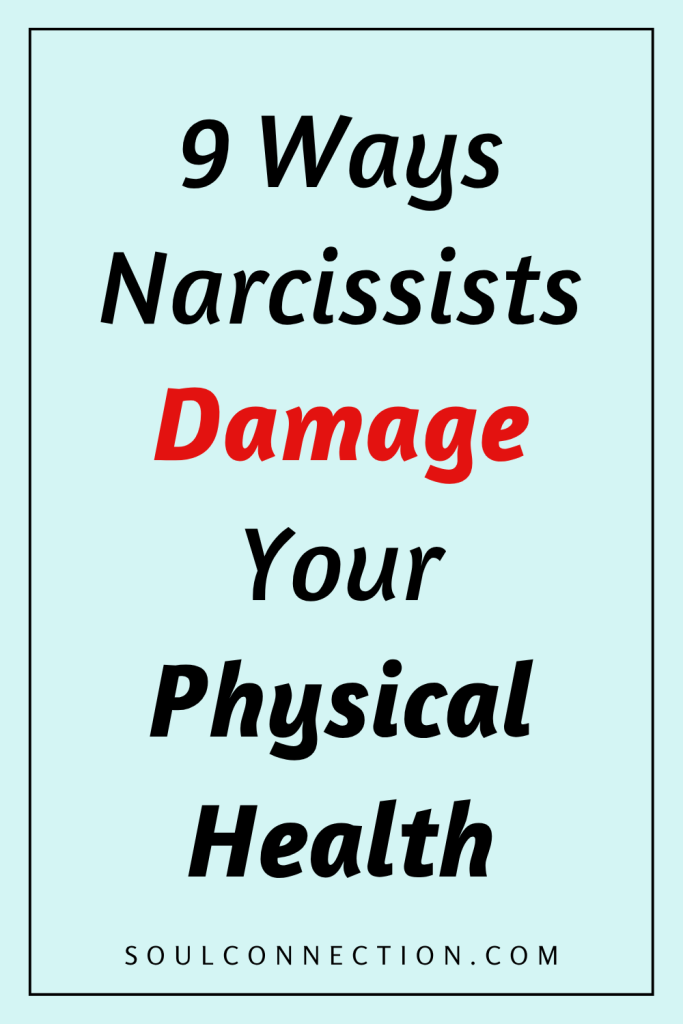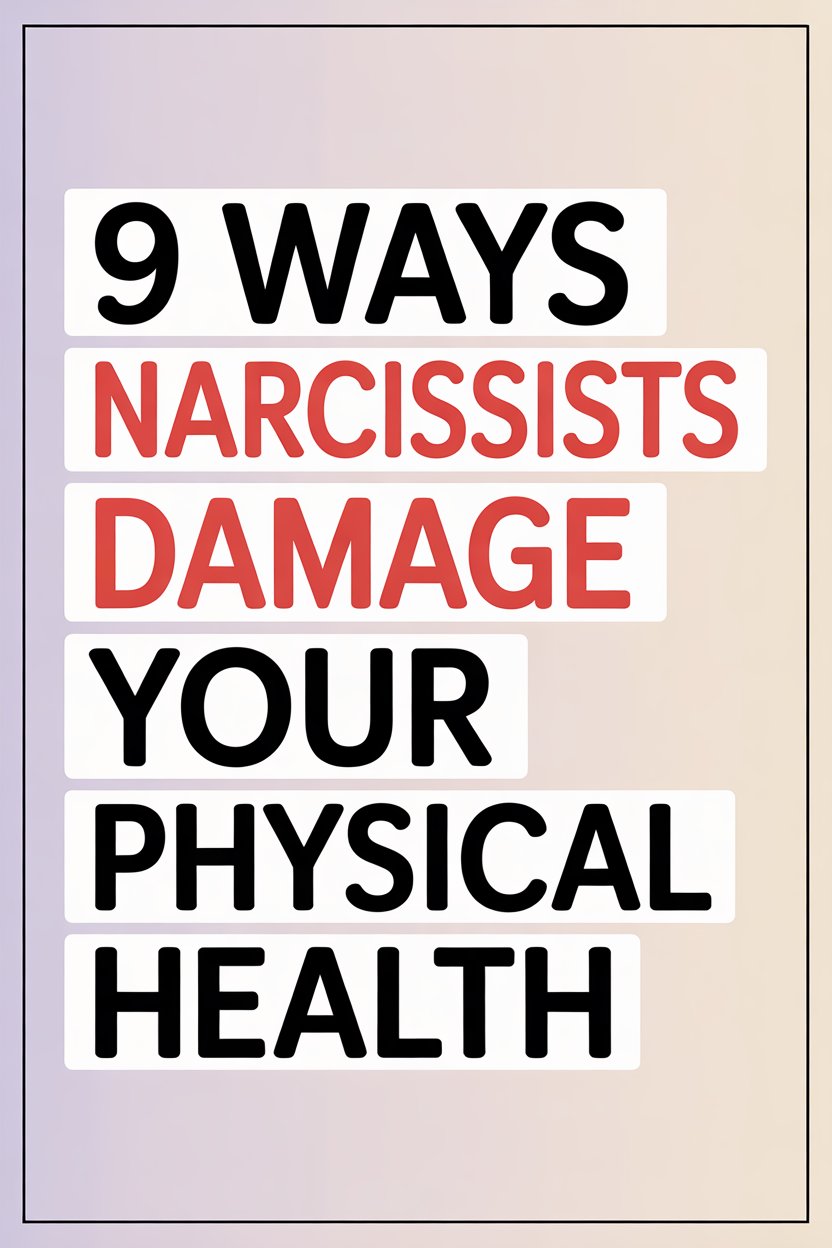Nobody signs up for a relationship thinking, “I hope they’ll leave me questioning my sanity and my cholesterol numbers.” Yet, here we are—somehow, the narcissist in your life has managed both.
Sure, most people talk about the emotional chaos, but your body’s not just along for the ride. It’s right there in the splash zone.
Below, the nine big ways narcissists can turn your body into collateral damage, plus ideas for grabbing back a little peace (and maybe a lower blood pressure reading).
1. Sleep Suffering Is Practically a Guarantee
If you’ve ever tried to get a decent night’s sleep with a narcissist in the house, you know: even counting sheep doesn’t work when one of them keeps poking you awake to start a fight.
Narcissists love drama at all hours—late-night arguments, passive-aggressive sighs, or the classic “silent treatment so loud you can’t ignore it.”
This constant disruption leaves you exhausted, irritable, and more likely to binge on caffeine than actually rest. Missing sleep isn’t just an annoyance; it increases your risk for heart problems, weight gain, and a general feeling of being run over by a lorry.
2. Chronic Stress Becomes Your New Normal
Living with a narcissist means your body operates in fight-or-flight mode more often than a squirrel at a dog park. Their unpredictable moods, manipulative tactics, and emotional landmines have your nervous system working overtime.
Stress hormones like cortisol and adrenaline get pumped out with the enthusiasm of a toddler on a sugar rush.
Chronic stress like this doesn’t just age you faster. It can trigger headaches, digestive problems, skin flare-ups, and even worsen conditions like diabetes and high blood pressure. If your heart’s racing, it’s not love—it’s likely anxiety.
3. Immune System Takes a Hit
Imagine your immune system as a bouncer. Now imagine it’s been up for three days straight, thanks to relentless drama at home.
Chronic anxiety and lack of quality sleep can drag your immune system down to the point where every passing cold becomes your new best friend.
People stuck in narcissistic relationships often find themselves sick more than usual—catching every bug, feeling run-down, or struggling to bounce back from minor illnesses.
Turns out, emotional vampires can make you physically sick, and not just in the poetic sense.
4. Eating Habits Go Out the Window
Some people eat their feelings. Others lose their appetite entirely. Either way, when a narcissist has you walking on eggshells, your relationship with food gets weird.
Maybe lunch is scarfed down in the car (because the kitchen’s become a war zone), or dinner becomes a non-event because you’re too anxious to feel hungry.
Long-term, this rollercoaster can lead to unwanted weight changes, nutritional deficiencies, and a complicated relationship with mealtimes. Comfort food is lovely in moderation. Living on crisps and biscuits to cope? Not ideal.
5. Physical Symptoms with No Obvious Cause
Doctors call this “somatic” symptoms: headaches, stomach aches, muscle pain, and more, often with no clear medical reason. Narcissists excel at making you doubt reality, which includes your own body.
The anxiety, tension, and constant vigilance your nervous system endures can manifest as real, physical pain.
You might spot a pattern—aches and pains seem to flare up after every blowout or silent treatment episode. Your body’s waving a white flag, trying to remind you it’s not enjoying this ride either.
6. Self-Care Gets Pushed Aside
Narcissists aren’t exactly known for encouraging rest and relaxation. If anything, they demand every scrap of your attention for themselves.
Time for self-care? Try again. That yoga class or walk with friends slips off the calendar, replaced with damage control and emotional firefighting.
Physical health routines—exercise, doctor’s appointments, even basic hygiene—can start to slide.
Of course, the narcissist will either not notice or complain that your “selfishness” is an inconvenience. (Nothing says romance like arguing over who gets to use the shower.)
7. Risky Behaviors Start Creeping In
When your reality feels like an episode of EastEnders, temptation to numb out grows strong. Emotional pain can lead people to drink more, smoke, or turn to other coping habits that, let’s just say, aren’t exactly endorsed by the NHS.
Maybe you start going out every night just to avoid home, overindulge in comfort food, or scroll until 3am. These habits offer relief in the moment but can slowly undermine your health, setting you up for bigger problems down the line.
8. Existing Health Problems Can Get Worse
Got a chronic condition? A narcissist is like adding petrol to the fire. Stress, sleep loss, inconsistent self-care, and emotional turmoil can worsen every ailment going, from migraines to IBS to autoimmune diseases.
Flare-ups become more common. Medications get missed. Appointments are skipped because you’re too exhausted or distracted by the latest drama. Your health deserves better than being collateral damage in someone else’s ego battle.
9. Leaving Becomes Physically Draining
It’s the grand finale: getting out. If you decide to leave a narcissistic relationship, your body won’t just breathe a sigh of relief and move on.
The stress of leaving—planning, packing, worrying about what comes next—can be exhausting. Adrenaline runs high, and your body might react with everything from insomnia to digestive chaos.
But there’s hope: many people find that, given time and safety, their bodies begin to heal. Sleep returns. Headaches fade. Colors seem brighter. Your body is designed to recover, even from this.
Getting Your Health Back on Track
Narcissists have an uncanny ability to leave their mark not only on your spirit, but also on the bits that show up at the doctor’s office. If you find yourself ticking off a few of these boxes, start with small, stubborn acts of self-care.
A real meal. Sleep in a locked room. Telling someone else what’s happening. Maybe even phoning that GP you’ve been putting off.
Community support, therapy, and genuine friends are lifesavers. If you’re feeling run down, it’s not “all in your head”—it’s in your nervous system, your immune cells, and your very bones.
With the right help and a bit of time, your health can recover from narcissistic chaos.
And one day, the only thing keeping you up at night will be the neighbour’s dodgy plumbing, not the sound of someone else’s ego echoing down the hall.
You (and your body) deserve peace. Don’t let anyone convince you otherwise.


